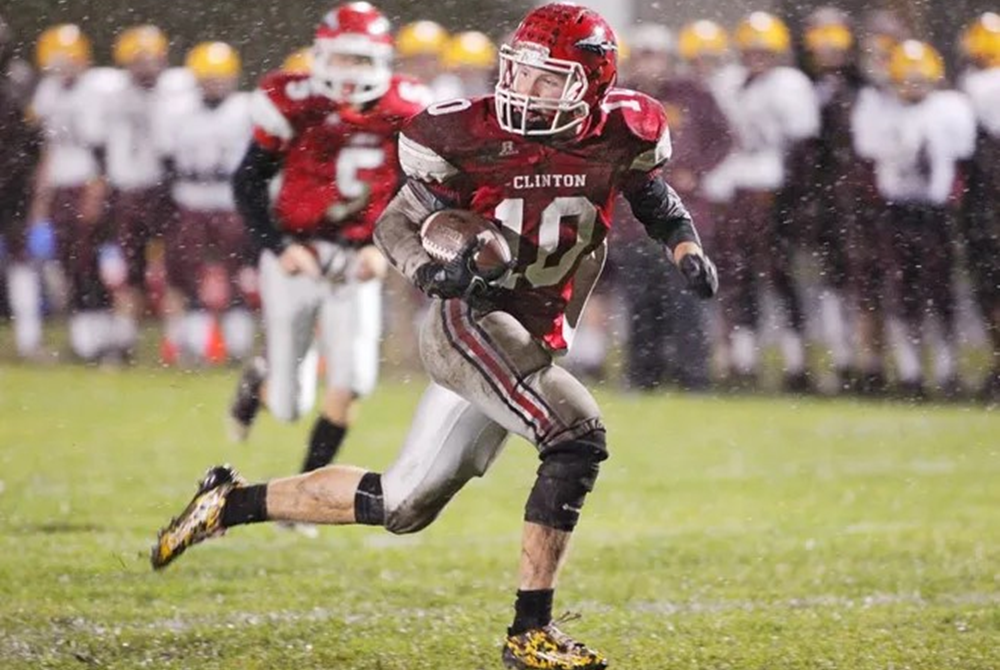
Tradition-Filled Tri-County Conference Kicking Off Final Season of 11-Player Football
By
Doug Donnelly
Special for MHSAA.com
August 20, 2024
The bus driver went too fast.
 It was fall of 1979, and Ottawa Lake Whiteford football coach John Hoover had come up with a plan for his Bobcats to dress in their own locker room, warm up on their own field and arrive at the Petersburg Summerfield football field for a Tri-County Conference battle just moments before kickoff.
It was fall of 1979, and Ottawa Lake Whiteford football coach John Hoover had come up with a plan for his Bobcats to dress in their own locker room, warm up on their own field and arrive at the Petersburg Summerfield football field for a Tri-County Conference battle just moments before kickoff.
The plan was working, except the bus driver went a little too fast.
“I don’t remember when I decided we would do it,” Hoover said. “But the night before our game, I got in my car, and I drove about the speed that I thought the bus driver would take from Whiteford to Summerfield. I had a stopwatch to time it just right. I didn’t tell anybody.”
The ploy was meant to rattle the opponent, perhaps make the other team lose focus on the game at hand.
“It’s only like 20 minutes between schools, so warming up at Whiteford and driving was no different than warming up at Summerfield and walking out to the field and waiting through the national anthem and the coin toss,” Hoover thought.
The scheme was working to perfection, but when Hoover determined the arrival would be too soon, he had the bus driver pull over just outside of Petersburg. Finally, the bus made its final trek and arrived.
On the first play from scrimmage, Summerfield fumbled, Whiteford recovered and scored a few plays later – the only touchdown of the game in a 7-0 Bobcats win.
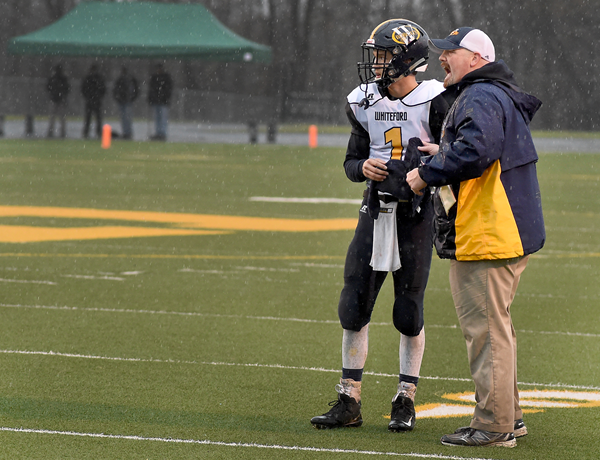 “I don’t know if it worked,” Hoover said. “But, when the bus got near, when we were driving up the road where the Summerfield stadium was, the head coach (LeRoy Wood) was out in the middle of the street, looking down the road, looking for us. I knew right then that it probably worked. It wouldn’t have worked if we had cell phones like they do today.”
“I don’t know if it worked,” Hoover said. “But, when the bus got near, when we were driving up the road where the Summerfield stadium was, the head coach (LeRoy Wood) was out in the middle of the street, looking down the road, looking for us. I knew right then that it probably worked. It wouldn’t have worked if we had cell phones like they do today.”
Summerfield and Whiteford have played some spirited games over the years as rivals in the Tri-County Conference. Unfortunately, the season that starts next week will be the last one for 11-player football in the TCC.
With the makeup of the league changing over the last decade or so and the move to 8-player football for three league schools, this is the final season for TCC football after 51 years of small-town competition.
The league has just three remaining schools playing 11-player football – Whiteford, Summerfield and Erie Mason. There is no TCC football schedule for 2025 and beyond, although the league itself will stay together for other sports.
“The 2024 season will be the last season that a TCC football champion is recognized in the current league format for football,” Britton Deerfield athletic director Erik Johnson said.
It will be the end of an era in southeast Michigan.
The league was formed in 1973 with schools from Washtenaw, Lenawee and Monroe Counties.
Several schools have taken turns at the top of the conference. Sand Creek has the most league championships, winning 15 between 1977 and 2011 – 14 of them under head coach Ernie Ayers. Morenci (9), Whiteford (7), Summerfield (7) and Clinton (7) have hoisted their fair share of league football trophies. Ayers is the winningest coach in league history, going 174-71 in league games over 38 seasons. Sand Creek left the TCC in football only after last season and will compete in the Big 8 Conference this season.
Whiteford is the only league school to win an MHSAA Finals football championship, but Sand Creek, Morenci and Clinton all have appeared in state championship games.
Both times Clinton played in Finals, Mathew Sexton was the star. Sexton would go on to play four years at Eastern Michigan University and has been in multiple NFL training camps and played in the XFL. He’s the league record holder for touchdowns and points scored.
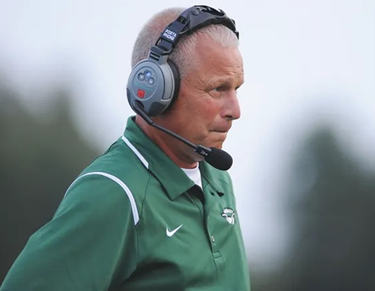 “I loved being in the TCC,” Sexton said. “It was great competition and was always a blast. Played with some great players, coaches and love the atmosphere each game would bring. Clinton and the TCC made me who I am today. I’m thankful for the experience it gave me.”
“I loved being in the TCC,” Sexton said. “It was great competition and was always a blast. Played with some great players, coaches and love the atmosphere each game would bring. Clinton and the TCC made me who I am today. I’m thankful for the experience it gave me.”
Summerfield graduate Jamie LaRocca was an all-state running back in the league, coached in the league and later watched his sons play football in the league as student-athletes at Whiteford.
“There were some great games, great battles,” LaRocca said. “Most of all, it was competitive. Sand Creek was good, Summerfield had good teams and Morenci had some great teams. Different teams always seemed to make their run.”
Britton and Deerfield were two charter members of the TCC, along with Ann Arbor St. Thomas (now known as Ann Arbor Father Gabriel Richard), Summerfield and Adrian Madison. During the 1990s, however, Britton and Deerfield formed a co-op and became Britton-Deerfield. They later officially combined high schools to become Britton Deerfield
BD had a dominating run on the football field in the late 1990s and early 2000s. Among the players who played for BD teams were Dan Musielewicz and Dustin Beurer. Beurer is now the head coach at Division II Northwood University while Musielewicz is head coach at Division III University of Olivet.
Beurer said he remembers as a high school student going to class with others from rivals Sand Creek or Madison at the Lenawee County Vocational Tech school all week, then playing against them on Friday nights.
“I get goosebumps thinking about those days,” he said. “It was small-town football at its finest back in the day.”
Brad Maska, now the head boys basketball coach at Onsted, was the BD quarterback when that team won multiple TCC titles.
“It is sad,” Maska said of the end of the TCC football era. “It truly was a great conference that produced a lot of great teams, coaches, and players throughout the years.
“The best part of the conference was the small-school pride from the communities. Friday night playing at Sand Creek or Whiteford when I was in school was always the only thing going on in town and the communities always got around us, and the atmosphere for small-school football was amazing.”
 Doug Donnelly has served as a sports and news reporter and city editor over 25 years, writing for the Daily Chief-Union in Upper Sandusky, Ohio from 1992-1995, the Monroe Evening News from 1995-2012 and the Adrian Daily Telegram since 2013. He's also written a book on high school basketball in Monroe County and compiles record books for various schools in southeast Michigan. E-mail him at [email protected] with story ideas for Jackson, Washtenaw, Hillsdale, Lenawee and Monroe counties.
Doug Donnelly has served as a sports and news reporter and city editor over 25 years, writing for the Daily Chief-Union in Upper Sandusky, Ohio from 1992-1995, the Monroe Evening News from 1995-2012 and the Adrian Daily Telegram since 2013. He's also written a book on high school basketball in Monroe County and compiles record books for various schools in southeast Michigan. E-mail him at [email protected] with story ideas for Jackson, Washtenaw, Hillsdale, Lenawee and Monroe counties.
PHOTOS (Top) Clinton’s Mathew Sexton scored more touchdowns in Tri-County Conference games than any player in league history. (Middle) Thomas Eitniear was the quarterback and Jason Mensing head coach at Whiteford when the Bobcats became the first school in Tri-County Conference history to win an MHSAA Finals football championship. (Below) Ernie Ayers coached at Sand Creek for 38 years and won 14 Tri-County Conference championships. (Photos courtesy of the Adrian Daily Telegram and Monroe News.)
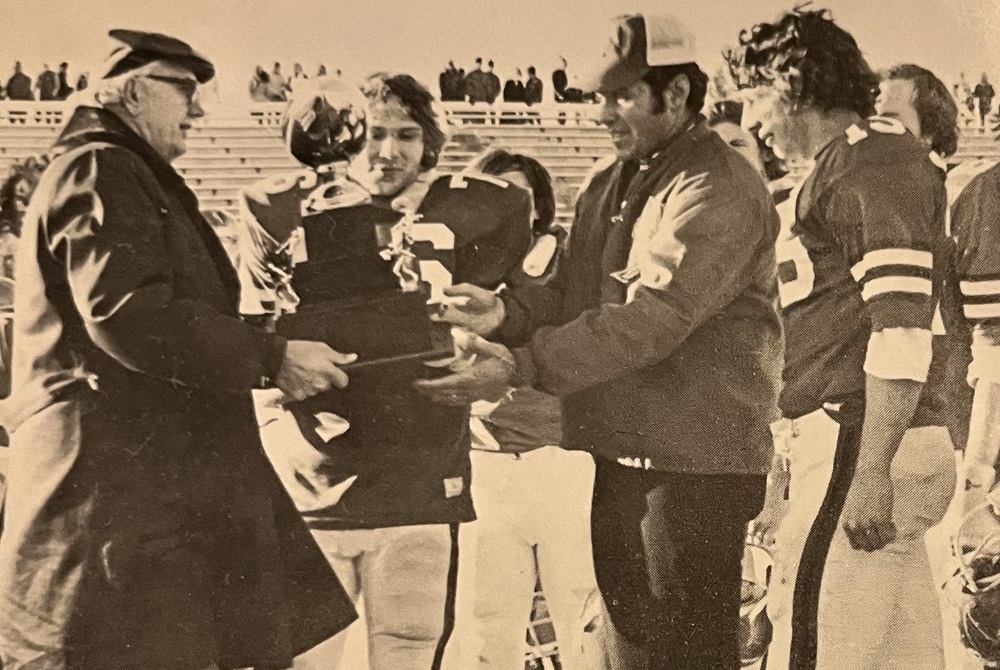
'Refuse to Lose' Divine Child Set Tone for Teams to Come with 1st Class B Title
By
Brad Emons
Special for MHSAA.com
November 15, 2024
There was no more conjecture, no newspaper or Associated Press polls to determine the state football champions.
The champion was no longer decided on paper, but out on the field as the MHSAA launched its first playoff tournament in 1975.
Only 16 total teams over four classes were invited to the dance.
And a school with an already a rich football heritage in Dearborn Divine Child proved it on the field with a 21-0 win over Saginaw MacArthur in the Class B title game before 4,000 fans at Central Michigan University’s Perry Shorts Stadium in Mount Pleasant.
In the Semifinals, MacArthur had outlasted Flint Ainsworth, 44-38, as senior halfback Mark Neiderquill rushed for 285 yards and four touchdowns, while Divine Child ousted Sturgis, 20-3.
In the frigid championship final on Nov. 22, the Falcons’ defense held MacArthur’s high-octane offense to seven first downs and 74 yards rushing. They caused three turnovers, with two fumble recoveries and an interception leading to all three of their TDs.
“I thought we could move the ball, but MacArthur was tough,” DC coach Bob LaPointe told the Detroit Free Press.
In the second quarter, Pat Doyle returned an interception 28 yards for a TD, and Mike Surmacz added the PAT for a 7-0 Divine Child advantage.
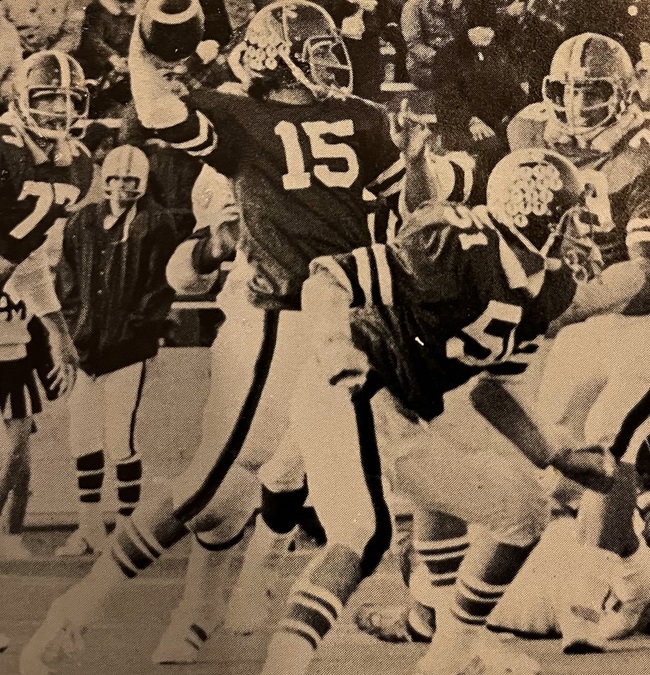 “That first interception really got us rolling,” LaPointe said. “Doyle can run the 40 in 4.9 and speed is what made that touchdown. But he got good blocking, too.”
“That first interception really got us rolling,” LaPointe said. “Doyle can run the 40 in 4.9 and speed is what made that touchdown. But he got good blocking, too.”
Two minutes later, Mike Wiacek gave DC another scoring opportunity when he recovered a MacArthur fumble at the Generals’ 24. Nine plays later, senior quarterback Dan Faletti swept right end and scored on a three-yard bootleg for a 14-0 lead.
“The big thing is that they had a good running back that we had to make sure we kept under control,” said Faletti, who went on to play at Eastern Michigan University before a neck injury prematurely ended his career as a sophomore. “We pretty much got the lead, and Bob was conservative. I just remember scoring that touchdown, and my picture made the paper the next day.”
Neither team could move the ball in the third quarter. There were no first downs.
All-stater Mike Svihra then picked up a fumbled lateral in the fourth quarter and ran 10 yards for the game’s final TD.
“It was not a lot of offense; it was a bitter, cold day,” said Faletti, who went on to work for the Department of Defense for 20 years and Ford Motor Co. before recently retiring. “Bob LaPointe ran a conservative offense. We did ball-control, we didn’t put tons of points on the board ... we didn’t fumble the ball. We didn’t throw interceptions.”
The game, ironically, was played on AstroTurf, not on real grass.
“Everyone makes a bit deal of it, but there really isn’t that much difference,” LaPointe added afterwards. “The only thing I regretted about this game was that I could dress only 44 of my 56 players under the rules. It was tough (to) tell the other 12 they couldn’t suit up.”
An 18-12 loss to Madison Heights Bishop Foley during the final regular-season game, spoiling what would have been an undefeated season in 1974, had left the Falcons distraught – but even more galvanized as they made preparations for the 1975 campaign.
The Falcons also changed their offense in 1975, switching to a triple-option attack that LaPointe got from Notre Dame. The offense proved to be good enough for a 9-0 regular season and an MHSAA playoff berth.
“We were an underdog the whole thing, the whole time, we were the underdog in every big game we played in, but we didn’t allow people to beat us,” said Wes Wishart, who coached the linebackers and offensive line that season before taking over the head coaching reins for the Falcons from 1978-95. “We refused to lose, and that was the motto. From ’74 on those group of kids said, ‘We refuse to lose.’ You use that phrase as a coach all the time, but this group of kids lived it. They were the ones that invented it. When things got tight, ‘refuse, refuse, refuse.’ We’re not backing off from anybody. Great group of young men, great players.”
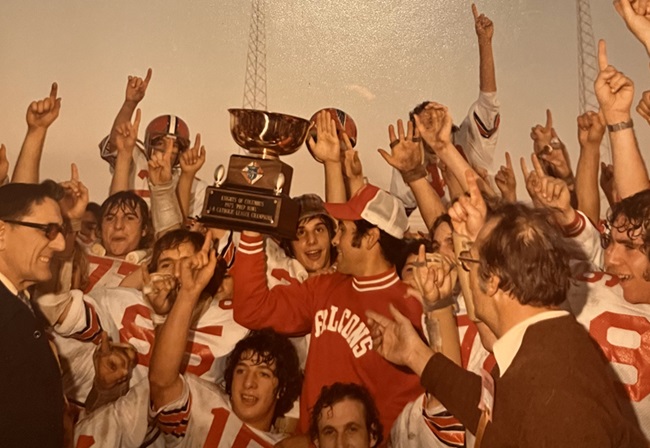 During the regular season, DC earned victories over highly-touted Flint Powers Catholic (20-14), previously unbeaten Southgate Aquinas (26-12) and Allen Park Cabrini (12-8).
During the regular season, DC earned victories over highly-touted Flint Powers Catholic (20-14), previously unbeaten Southgate Aquinas (26-12) and Allen Park Cabrini (12-8).
That set up a Catholic League Prep Bowl showdown in the final game of the regular season against highly-touted 8-0 Birmingham Brother Rice, which was ranked No. 1 in the final regular-season AP Class A poll.
Although the Falcons were a decided underdog, the AA division champs upended Rice, 7-0, before a packed crowd at Eastern Michigan University’s Rynearson Stadium to snap the Warriors’ 22-game winning streak thanks to Jim Kempinski’s fumble return for a seven-yard touchdown as he snagged the ball in mid-air and never broke stride while crossing into the end zone.
“We played our butts off,” Faletti said. “It was a dog-eat-dog game.”
It was DC’s 11th Catholic League title, but more importantly put the Falcons into the first MHSAA Playoffs against Sturgis in a Semifinal match at C.W. Post Field in Battle Creek.
“I remember everything was brand new; nobody knew what they were doing,” said Wishart, who guided the Falcons to the 1985 Class A crown as their head coach. “Coach LaPointe on Monday had to get the school to get our hotel rooms in Battle Creek.”
Steve Toepper booted a 27-yard field goal for Sturgis to open the scoring, but DC responded with 20 unanswered points.
In the final quarter, DC’s Rick Rogowski scored on a seven-yard run with 9:23 left (after Steve Savini recovered a fumble caused by Joe Wiercioch) followed by a 10-yard TD run by Faletti with only six minutes to go (after Svihra recovered a fumble).
That sent the Falcons into the Final at CMU, where their defense suffocated MacArthur (9-2).
“We kind of ran a special outside zone. We had to quickly change (how) we would defend that. We shut them down,” said Wishart, who spent 50 years in CYO and high school coaching before retiring to live in New York. “There was no doubt, we were more physical than they were. We were blue collar kids. Typical Divine Child kids, hard-working, never give up.
“We believed desperately in defending Divine Child at all costs because we were a smaller school, so we had an attitude that still lingers there today that we all cultivated. We were going to be a physical squad.”
Meanwhile, what made the Falcons special and unique that title season was their “one for all and all for one” attitude.
“Everybody was the same,” Faletti said. “When we went between the lines, we were all equal. As captain, I got to be command as quarterback in the huddle. But off the field we were all equal. We played like 22 seniors. We were ready for this game.”
PHOTOS (Top) Dearborn Divine Child coaches and players receive the Class B championship trophy after winning the inaugural title game in 1975. (Middle) Falcons quarterback Dan Faletti throws a pass during the Final. (Below) Divine Child players and coaches raise their Prep Bowl trophy in celebration. (Championship game photos courtesy of Dearborn Divine Child yearbook. Prep Bowl photo provided by Dan Faletti.)

